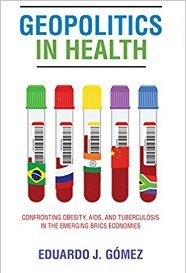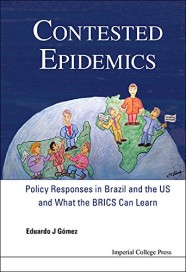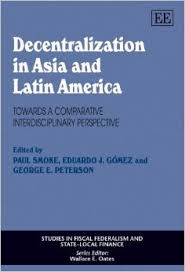
Books
Geopolitics in Health: Confronting Obesity, AIDS, and Tuberculosis in the Emerging BRICS Economies
ICP; 1 edition (2018)
Eduardo J. Gómez
King’s College London
In recent years, political leaders in Brazil, Russia, India, China, and South Africa, collectively known as the BRICS, have worked to reformulate international discussions and policies on issues ranging from fair and free trade to human rights. When it comes to health epidemics, however, the BRICS have differed greatly in terms of how―and when―they respond, highlighting important differences in their political commitment to meeting healthcare needs.
In Geopolitics in Health, Eduardo J. Gómez takes a critical look at how the emerging BRICS economies dealt with the obesity, AIDS, and tuberculosis epidemics. Despite the countries having similar international political and economic ambitions, Gómez finds that domestic policy responses were driven mainly by international, as opposed to domestic, pressures and interests. Using a theoretical framework called geopolitical positioning, Gómez explores how nations respond to international pressures and policy criticisms, as well as their willingness to receive financial and technical assistance, to use domestic policy innovations, and, ultimately, to engage in global health diplomacy in order to bolster their international reputation.
Gómez draws on extensive data and case studies and argues that leaders aspiring to build their reputations among elite nations have a ready way to demonstrate their status through quick and effective public health responses, whereas those who scorn the international community tend to react slowly and ineffectively to the same type of crises. The first book of its kind to conduct an in-depth comparative historical analysis of how the BRICS deal with public health threats, Geopolitics in Health demonstrates the value of positive geopolitical positioning and strong partnerships with other governments, nongovernmental organizations, and social health movements.

Contested Epidemics: Policy Responses in Brazil and the US and What the BRICS Can Learn
(London: Imperial College Press, 2015).
Eduardo J. Gómez
King’s College London
This book compares the United States to Brazil in the area of the international and domestic politics of government response to health epidemics. Combining international relations and comparative institutional theory, I argue that Brazil eventually outpaced the United States in its policy response to diseases such as syphilis, tuberculosis, and polio historically, to HIV/AIDS, tuberculosis, and obesity today. These differences in outcomes occurred because of the Brazilian government’s interest in buildings its international reputation in health while simultaneously working closely with civil society. This book then compares Brazil to the rest of the BRICS nations, while closing with key lessons that policy-makers in the United States and the other emerging nations can learn from Brazil.

Decentralization in Asia and Latin America: Towards a Comparative Interdisciplinary Perspective
Paul Smoke
New York University
Eduardo J. Gómez
King’s College London
George Peterson
Urban Institute
This books explores the creation and evolution of fiscal decentralization policies in Latin America and Asia. An interdisciplinary social science theoretical and empirical perspective is used to account for variation in decentralization processes and outcomes in these nations. Several case studies are analyzed and compared, such as Brazil, Mexico, Peru, Argentina, Vietnam, Cambodia, India, China, and Indonesia. This book should be of interest to political scientists and economists interested in the evolutionary nature of decentralization process in comparative perspective.
